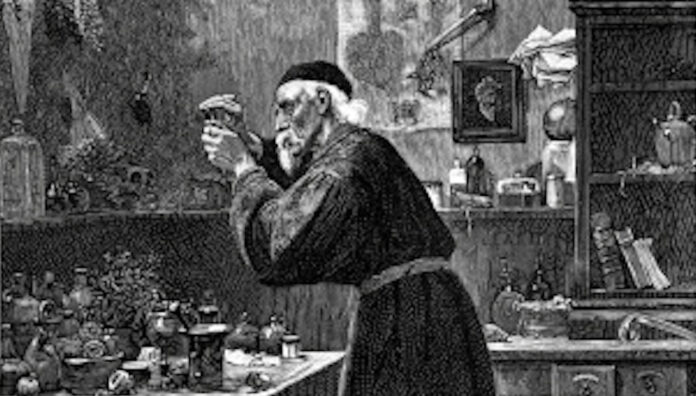From pepperers of the 1100s to UTI prescribing, it’s been at least 1,000 years.
The origins of pharmacy can be traced to the Guild of Pepperers. It was formed before pepperers, spicers and apothecaries, who all dealt in ‘spicery’ which included crude drugs, were first recorded in the Pipe Roll [early English financial records] of 1180.1 In 1428 the pepperers became wholesale merchant traders dealing en gros (‘grocer’) and became what was to be the Grocer’s Company. Apothecaries sought independence. They believed the preparation and manufacture of medicines made them different from grocers. Though opposed by physicians, in 1617 by Royal Charter, the Worshipful Society of Apothecaries was incorporated.2
The great plague
When the plague arrived in London in 1665 the wealthy and their physicians left London for the countryside. This left the poor of London to be treated by apothecaries. Dr T. D. Whittet3 recorded their service and sacrifice, even listing apothecaries who had died serving the populace. This dedication gained them the right to treat patients provided they did not charge a fee, a charge restricted to physicians.
Rose v College of Physicians
Apothecary William Rose was charged with practising as a physician in Rose vs the College of Physicians and was convicted and fined £5. The case would have severely restricted all
apothecaries. The Society appealed by applying for a writ of error in the House of Lords and achieved a reversal of the previous verdict in 1704.4 In 1815 the Society was given the right to examine people to practise medicine. They effectively became the general practitioners of today.5
In Australia
There is debate about who was the better qualified of our first pharmacists but John Tawell started practice in 1820 in Sydney and Alexander Manners in 1821 in Hobart.
The Pharmaceutical Society of Queensland, although formed in October 1880, after similar bodies in NSW and Victoria, was the first to be incorporated by “letters patent” in 1912.6 Pharmacists continued treating people, but did not charge a fee. The downscheduling of many Prescription Only medicines to Pharmacist Only medicine in the latter half of the 20th Century provided pharmacists a wider range of products with which to treat people – still a fee-for-medicine rather than fee-for-consultation.
But charging for cognitive services took its biggest step in 1992 when the Australian Association of Consultant Pharmacy was formed. For the first time pharmacists were paid for consultations where accredited pharmacists were to provide ‘ cognitive services’ – HMRs and RMMRs – for a fee. After the Queensland Pharmacist Immunisation Pilot (QPIP)8 was conducted in 2014, the Extended Practice Authority allowed pharmacists to prescribe and administer influenza vaccines. This was later extended to cover other vaccines including those for COVID-19 – the first program to fully fund pharmacist administration of a medicine.9
Further trials, including initiating treatment for uncomplicated urinary tract infections (UTIPP-Q), have produced good results.10 Like the great plague of 1665, the COVID-19 pandemic has demonstrated the value of pharmacists, and accelerated practice evolution.
References
- Whittet TD. Pepperers, spicers and grocers – forerunners of the apothrcaries. Proc R Soc Med 1968;61:801–6.
- The Worshipful Society of Apothecaries. History. 2022. At: www.apothecaries.org/history/
- Whittet TD. The Apothecaries in the Great Plague of London 1665; Sydenham Lecture of 1965. Proc R Soc Med 1973;66(2)214.
- Rose vs The College of Physicians (In Error), 1704, UK Parliament, Parliamentary Archives, HL/PO/JO/10/6/63/1993
- The Worshipful Society of Apothecaries, 2022. At: www.apothecaries.org/history/origins
- Pharmaceutical Society of Queensland. A centennial history of the Pharmaceutical Society of Queensland. Pharmaceutical Society of Queensland. 1980. Spring Hill, Queensland. p 1–7.
- Australian Association of Consultant Pharmacy. 2022. At: https://aacp.com.au/about-us/about-aacp/
- Nissen L, Glass B, Lau E, et al. Queensland pharmacist immunisation pilot phase 1 pharmacist vaccination – influenza final report. Queensland University of Technology. 2015. At: https://eprints.qut.edu.au/91903/
- Queensland Government. Medicines and Poisons Act 2019: Extended practice authority ‘pharmacists’. 2021. At: www.health.qld.gov.au/__data/assets/pdf_file/0027/1108944/epa-pharmacists.pdf
- Queensland Government. Queensland Cabinet and Ministerial Directory. Queensland women guaranteed greater access to treatment for UTIs. 2022. At: https://statements.qld.gov.au/statements/95679






 ‘We’re increasingly seeing incidents where alert fatigue has been identified as a contributing factor. It’s not that there wasn’t an alert in place, but that it was lost among the other alerts the clinician saw,’ Prof Baysari says.
‘We’re increasingly seeing incidents where alert fatigue has been identified as a contributing factor. It’s not that there wasn’t an alert in place, but that it was lost among the other alerts the clinician saw,’ Prof Baysari says.





